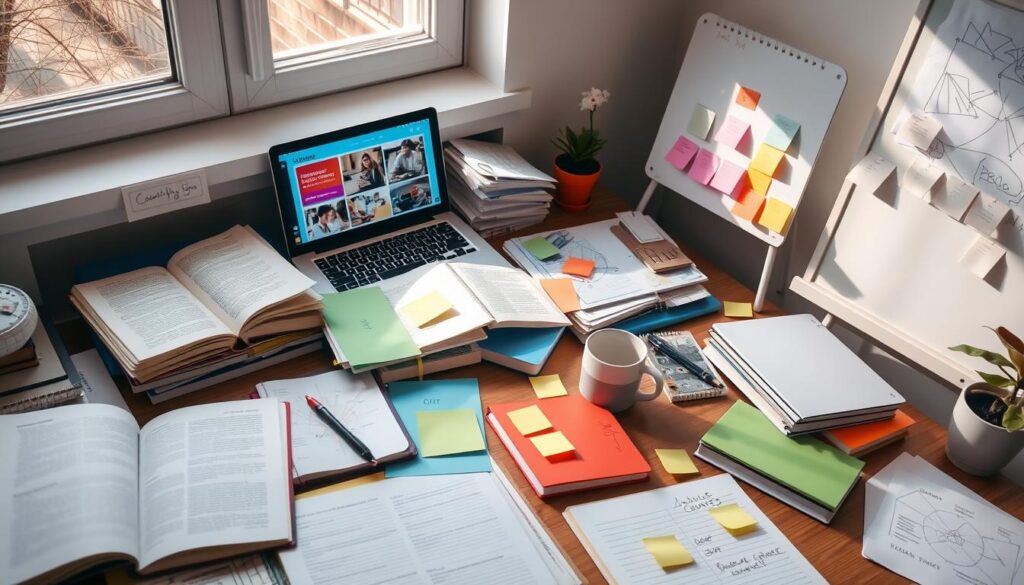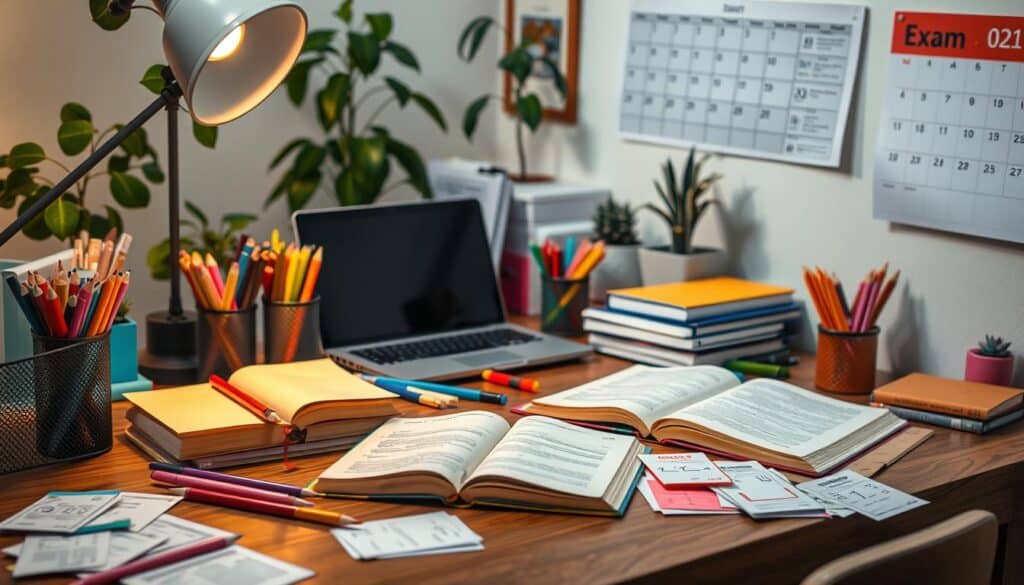Getting good grades often depends on how well you study and prepare for exams. Whether you’re in university or high school, knowing the best ways to study can really help. Exam Tips And Tricks It can make a big difference in how well you do.
This guide will show you how to make the most of your study time. You’ll learn how to work with others and use all the resources available. By using these tips, you’ll remember more and feel more confident when it’s time to take your exam.
Key Takeaways
- Attend all class sessions and actively participate to improve exam performance by 10-15%.
- Engage in group study activities to enhance information retention by up to 75%.
- Utilize office hours and tutoring services to gain a 20% boost in course understanding and exam scores.
- Leverage flashcards and varied study environments to increase memory retention by 50% and 15-20%, respectively.
- Prioritize a balanced lifestyle, including proper sleep and nutrition, to score 10-15% higher on exams.
Make the Most of Class Time
To do well in your studies, it’s key to make every class count. Attend all class sessions, listen closely to lectures, and take detailed notes. If something’s not clear, don’t be shy to ask questions. This way, you’ll understand the material better and get ready for exams.
If you’re in a digital classroom, make sure you have the right technical requirements and necessary equipment. You’ll need a stable internet, working camera and mic, and any special software. Setting up your digital space well helps you participate fully and get the most from class.
| Effective Classroom Habits | Advantages |
|---|---|
| Attend all class sessions | Gain a comprehensive understanding of the course material |
| Pay close attention to lectures | Deepen your knowledge and identify key concepts |
| Take comprehensive notes | Create a valuable study resource for exam preparation |
| Ask questions when needed | Clarify any uncertainties and engage actively with the material |
| Ensure digital classroom readiness | Participate effectively in virtual learning environments |
By using these tips, you’ll make the most of your class time. This will help you prepare well for exams.
Collaborate and Learn from Others

Working with your classmates can really help you get ready for exams. By joining study groups, you can go over the material together. This way, you can also talk about important topics and feel more confident.
When you teach your friends about what you’ve learned, you get to understand it better. You also improve your speaking and leadership skills. It’s a win-win situation for everyone.
Form Effective Study Groups
A good study group usually has four to five people. This size makes sure everyone gets a chance to talk and share ideas. It’s important to listen well and have roles like a leader and a recorder to keep things organized.
Try to keep your study sessions short, about 45-60 minutes. Take a 10-minute break in the middle to stay focused. Find a quiet place, like a library room, to study without distractions.
Teach and Explain Concepts to Classmates
Teaching others what you know is a great way to learn more yourself. It helps you think critically and communicate better. In a study group, everyone can take turns explaining topics and giving feedback.
By working together and actively learning, you’ll feel more confident. You’ll also understand the material better and do well on your exams.
Utilize Available Resources

As you get ready for your exams, make sure to use all the resources you can. Your professors’ office hours are a great place to start. You can ask them to explain tricky concepts and get tips on how to prepare for exams.
Your school also has many tutoring and support services. These can give you the extra help you need to feel ready for your exams.
Tap into Professors’ Expertise
Your professors are full of knowledge and want to help you do well. Use their professors’ office hours to clarify concepts and get exam preparation tips. They’re there to help you succeed.
Utilize Tutoring and Academic Support
Your institution has many tutoring options and academic support services. From private tutoring to group study sessions, these resources can give you the support you need.
“The key to success in any exam is to make use of all the resources available to you. Don’t be afraid to ask for help – your professors and the support services at your institution are there to help you achieve your academic goals.”
Exam Tips And Tricks

Getting ready for exams? It’s key to use many strategies to improve your study routine and exam scores. From organizing your notes to visualizing important concepts, these tips can greatly help your prep and success.
Organize and Review with Flashcards or Digital Apps
Flashcards or digital apps are great for organizing and reviewing your notes. They help break down tough topics into smaller, easier-to-remember chunks. Digital apps also let you organize your study material and study anywhere.
Find Your Productive Study Environment
Try out different study environments to find what works best for you. Some like quiet spots, while others prefer busier places. Look at lighting, temperature, and noise levels to see what helps you focus best.
Switch Topics to Prevent Fatigue and Increase Retention
Changing topics often during study sessions can help avoid burnout and boost retention. It keeps your mind active and prevents overstudying one subject, which can hurt your prep.
Visualize the Material with Charts, Diagrams, and Outlines
Using charts, diagrams, mind maps, and outlines can really help you understand and remember material better. These tools make complex info easier to grasp and recall, fitting your learning style.
Remember, everyone learns differently. Try out these strategies and find what works best for you. With effort and the right approach, you’ll do great on your exams.
Also Read : How To Find Effective Study Materials For Your Exam
Conclusion
Mastering exam tips and tricks is key to doing well in school. Students can improve their study habits by using class time wisely, working with others, and tapping into resources. Techniques like making flashcards and finding the right study spot help a lot.
These exam tips and tricks can make studying more effective. They also help students stay healthy and boost their memory. Remember, regular practice and being open to new study methods are crucial. This way, students can feel ready to face their exams and reach their goals.
Getting good grades takes hard work, being organized, and knowing how to study well. By using the tips from this article, students can reach their full potential. They will be well-prepared for their studies.
FAQs
Q: What should I do on the exam day to ensure I perform well?
A: On the exam day, make sure to arrive early, have a nutritious breakfast, and pack any necessary materials. Review your study plan briefly to boost your confidence, but avoid cramming at the last minute. Stay calm and focused, and remember to take deep breaths to reduce stress.
Q: How can I create an effective study plan for my upcoming exams?
A: To create an effective study plan, start early by breaking down your subjects into manageable sections. Schedule specific times for each topic, allowing enough time for review and practice. Include regular breaks and ensure to organize your study materials for easy access.
Q: What are some tips for organizing my study materials?
A: Organize your study materials by subject matter and format, such as notes, textbooks, and additional resources. Use folders or binders to keep everything in one place, and consider highlighting key points to enhance your comprehension. A tidy workspace can also help you stay focused.
Q: Is cramming a good strategy for studying?
A: Cramming is generally not recommended as it can lead to increased stress and lower retention of information. Instead, try to start early and develop a study routine that works for you. This allows for better comprehension and long-term retention of the material.
Q: How can I stay focused while studying?
A: To stay focused while studying, create a distraction-free environment. Limit the use of computer games and turn off notifications on your devices. Use techniques like the Pomodoro technique, which involves studying for a set time and then taking a short break. Drinking plenty of water and having a healthy snack can also help maintain concentration.
Q: How can teaching others help with my study process?
A: Teaching others is a hands-on way to reinforce your understanding of the subject matter. When you explain concepts to someone else, it helps you revisit and verify your knowledge, ultimately improving your comprehension and retention of the material.
Q: What should I do the night before the exam?
A: The night before the exam, make sure to review the material lightly without cramming. Focus on areas where you need more practice and ensure you get a good night’s sleep. Avoid studying late into the night, and instead, engage in relaxing activities to reduce stress and prepare your mind for the exam.
Q: How can I utilize additional resources effectively while studying?
A: Utilize additional resources such as online study materials, videos, and practice exams to enhance your understanding of the subject. These resources can provide different perspectives and examples that may help you grasp complex concepts better. Incorporate them into your study plan accordingly.
Q: What are some effective time management strategies for studying?
A: Effective time management strategies include creating a detailed study schedule, setting specific goals for each study session, and prioritizing tasks based on your exam dates. Make sure to allocate enough time for review and practice tests, and be flexible to adjust your plan as needed.
Q: How can I reduce stress before and during the exam?
A: To reduce stress before and during the exam, practice relaxation techniques such as deep breathing and visualization. Ensure you are well-prepared by following your study plan and revising the material. On exam day, maintain a positive mindset, and remember that you have done everything you need to know to succeed.
Source Links
- https://shorelight.com/student-stories/21-best-study-tips-for-final-exams/
- https://www.uopeople.edu/blog/how-to-study-for-exams-strategies-and-tips/
- https://www.princetonreview.com/college-advice/how-to-study-for-exams
- https://www.oxford-royale.com/articles/managing-time-exam/
- https://learningcenter.unc.edu/tips-and-tools/studying-101-study-smarter-not-harder/
